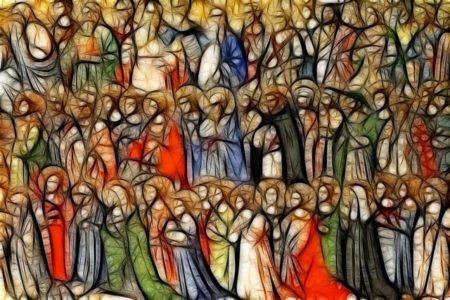Three Truths from All Saints’ Day and the Church Universal

At World Methodist Evangelism, we engage with the world in ways which feel current and timely. Often, I travel to wonderful places around the world where I witness to and participate in God’s inbreaking Kingdom. It is amazing to see the same Spirit of God at work in different cultures, through different languages.
Yet the church is not just what we can see here and now. When we participate together in worship, we not only allow God to form and shape our hearts, we allow other Christians to serve as channels of God’s grace in our lives. Even further, we allow ourselves to be shaped and molded by other Christians long gone who came before us – sisters and brothers who wrote prayers, hymns and established worship practices many centuries before we were born.
Last week, many Christians observed All Saints’ Day, and yesterday congregations set aside time to remember the saints from local churches who died in the past year. These times often are marked by gratitude for their lives and examples, grief at their loss, and hope for ultimate reunion and restoration. Honoring All Saints’ Day can point us to three simple truths about the universal church.
First, the church is bigger than we can imagine. Not only is it difficult to remember how many Christians are living and worshiping around the world, it can also be a challenge to recall, along with the writer of the book of Hebrews, that we are surrounded by a “great cloud of witnesses.” It is hard to feel isolated or alone when we read about the lives of Christians who have come before us.
Second, the church existed before easy international travel was possible. Now, one can fly from one side of the globe to the other in 24 hours or less. But technology does not make the church possible: the church was birthed in a simple room where people were gathered praying to receive the Holy Spirit. Throughout the centuries, the church was never extinguished. Certainly, technological advancements helped certain movements of God, like the invention of the printing press or ships built to cross oceans. They are tools that can be used, but the church is not dependent on these tools: the church is only dependent on God.
Third, the church outlasts kingdoms, nations, empires, and leaders. Dynasties rose and fell, kings lived and died, nations conquered and diminished. Whatever the local context, the church has always outlasted it, because it is founded on Jesus Christ, not on any nation’s values or goals. No tyrant can destroy the church, and no hero can save it: it is the Body of Christ enlivened by the Holy Spirit, beyond eradication. We can steward it well through the insights of scripture and the examples of the saints and the empowering of the Holy Spirit, but no one owns it.
How do you picture the church? Have you fostered an awareness of the great communion of saints in which you participate? What are your hopes for the Body of Christ this year?